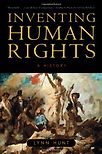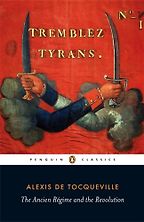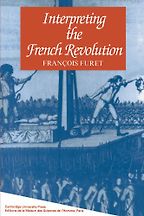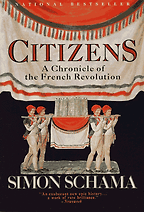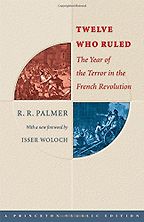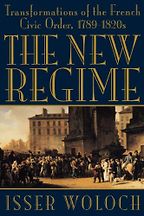The French Revolution is one of the most important – perhaps still the historical event of all time. Many books have been written about it, but I loved your comment, in your presidential address to the American Historical Association that “every great interpreter of the French Revolution – and there have been many such – has found the event ultimately mystifying”.
I think in this regard it may just be a handy exemplar of historical events generally. What’s so striking about the French Revolution is that events unfold over a sufficiently long period of time that people can get a sense of how it is that events unfold in an unpredictable fashion. People study it, in part, because it is a kind of laboratory model of the really striking event and it takes place over years, instead of being condensed in time the way more recent revolutions, perhaps, are.
Many people have tried to explain why the French Revolution is the way it is. What they discover is that the more they find out about it, the more they have questions. It’s very difficult to penetrate; things spiral in a direction you don’t expect. And as much as one tries to tie that down with rational explanations – social causes, demographic causes, economic causes, political causes, ideological causes – there is a way in which the experience that goes on in an event is very hard to completely explain. It is actually true of all events, it’s just that we don’t usually spend that much time thinking about every single event in our life. But if we did, I suspect we’d have the same sense of, “Wow. How did that happen in that way?”
Most of the great interpreters did not end their writing about the revolution and say, “Oh yeah! I really figured it out.” They said to themselves, and in print, that there is something about it that’s just extremely hard to get at, try as you might. Edmund Burke, in 1790, is already expressing this kind of wonderment: It’s so incredible what’s happening, I’m thinking about it, I’m trying to figure it out, and there’s still some way in which I just can’t believe it.
Looking back from our non-monarchical era of government, it’s hard to appreciate the enormity of an event where you end up beheading the king.
A king had been beheaded before, as we know, in England. But there was a way in which, in the French case, they celebrate having done it. There’s immediate writing about why this is making a point. In the English case, it was more, “We had to do it, because of the circumstances.” It isn’t connected to any re-imagining of the entire political order.
Let’s go through the books you’ve chosen. Your first choice is by one of the greatest interpreters of the revolution, Alexis de Tocqueville. He was actually born in 1805, after the revolution, but he did a lot of archival research. Tell me about his book, The Ancien Régime and the Revolution.
What is so great about Tocqueville is that he looks at archives and studies the events, but he applies to it an amazing synthetic and analytical intelligence. It’s the same intelligence that he applied to American society, which he visited in the 1830s.
What’s striking is that he is able to develop broad analytical categories that relate the French Revolution to the direction of modern society as a whole, which he sees as the destruction of the aristocracy and the coming of democracy. But he adds a twist that will remain influential to this day, which is that he points to the weakness of democracy as a form of government. It has an internal, inherent tendency to lead to despotism unless there are certain conditions that prevent that from happening.
“Democracy has an internal, inherent tendency to lead to despotism”
This is an incredibly brilliant perception. He comes to it, in part, because he is involved in the 1848 revolution, and he’s unbelievably disappointed by the rise of Louis Napoleon [Napoleon’s nephew, who became Emperor Napoleon III in 1852]. He was born in the Napoleonic period, and he says, “How can this be? We have these revolutions in the name of liberty and we end up with a despotic, authoritarian ruler.” It’s a problem we still grapple with today. Why do revolutions in the name of democracy – we see them happening at this very moment – end up having a problem institutionalising themselves as true democracies?
Do we have any answers?
The Tocquevillean answer is still an incredibly important answer, which is that you are more likely to end up as a democracy if you have institutions that support a democratic political life. It’s a tragedy and a paradox. You make a revolution because you don’t have the institutions that support a democratic political life. You do it in order to get a democratic political life, but you don’t have the infrastructure in place to make that possible. So the question becomes how do you get from the desire to the reality of democratic political life?
What Tocqueville loves about the United States is that they have this infrastructure already, because of the forms of local representative government that had already developed before they broke from Great Britain. But he’s leaving us with a problem that we still have to confront. Should we not want people to have democracy if they don’t have the institutions already? If they’re not already democratic can we really say that to people in the world: “I’m sorry you don’t have democratic institutions, therefore you’re not really able to have democracy.” Of course we can’t. So we have to figure out how you make this transition.
My own personal critique of Tocqueville is that he is too negative about what goes on during the revolution. What goes on during the revolution is, in my view, an incredible upsurge of new kinds of democratic institutions. It’s just they don’t have time to totally take root.
So, like many historians, Tocqueville’s book is a comment on his own times?
Yes, but he is able to stand back. What’s amazing is that he is actually a minister in the 1848 government. It’s not that he’s just kind of around. He’s actively involved, and yet he’s able to deliver this analytical tour de force. After the events unravel in the way they unravel, he is able to stand back and say, “What is going on? What explains how this could possibly happen? Why does this keep happening in French society?”
What’s incredible about Tocqueville – and I’m not particularly sympathetic with his political point of view, necessarily – is his intelligence in grasping these fundamental categories and explaining them in the most amazingly penetrating, limpid and fascinating prose. He gives you these turns of phrase – you actually can’t believe it when you’re reading it. You just think, “Wow. That is such a great way of saying it.”
In terms of his specific arguments, he talks a lot about the continuities between the Ancien Régime and the post-1789 world, especially in terms of centralisation of government. Is that an important part of the book?
It’s absolutely crucial and probably the single most important thing that he is arguing. I’m actually not convinced he is right about it, but it’s a very powerful analysis. He basically says that countries develop a style of governing and that it’s extremely difficult to get away from that style of governing. For example, in interpretations of the Russian Revolution there’s a complete division between those who feel that communism took over the basic characteristics of Tsarist rule – which was incredibly centralised and authoritarian, and relied on the secret service – and those who believe that Marxism completely changed everything.
This kind of division of opinion exists for all the major revolutions, in part because of the influence of this Tocquevillean analysis, which is that you have a style of ruling, and it’s very hard to change it.
The other thing that jumped out at me as I was reading it is that Tocqueville seems to rather like Louis XVI. He refers to him as “this kindly and unfortunate prince”.
Yes, he really doesn’t like Louis XIV, but he really likes Louis XVI. Historical opinion is now in fact much kinder to Louis XVI. Louis XVI tried to reform, he tried to be a good king, he didn’t have any mistresses, he wasn’t wasting a lot of money buying baubles for members of his court. He was trying to be the new-style king, but in a situation in which it turned out to be impossible for him to push that through as a project.
So do historians agree with Tocqueville’s analysis that “nothing is more dangerous to a regime than when it tries to reform itself”?
So much in Tocqueville has had such an enormous influence on social scientific thinking about social and political movements. So yes, amongst them, is what’s called the revolution of “rising expectations”. He points to the fact that it’s not a France that’s in misery, it’s a France that’s getting better and better off. This is the problem. People have higher expectations and then they’re more disappointed.
Tocqueville just had all these incredibly brilliant insights about how this worked, and part of it was because, frankly, he didn’t write in the historical mode. He wrote in a sociological mode. So he could say: “I don’t need to tell you what happened in 1789, I’m just going to tell you what it meant.”
Let’s go on to François Furet, and his book Interpreting the French Revolution, published in 1978. So he was a great French historian, elected to the Academie Française in 1997. This book is actually quite hard to read if you don’t know a lot about the French Revolution, isn’t it?
Yes. Tocqueville’s book had an incredibly wide influence in a variety of fields, with a variety of readerships. Furet’s book, on the other hand, was very much a book for people who already knew something about the subject. It had a staggering impact on the way historians viewed the French Revolution, because he was an extremely effective polemicist. The opening essay in this book, “The Revolutionary Catechism”, is just devastating and no other approach would probably have had the decisive impact it had.
It’s written in a drippingly ironic and satirical mode of rhetoric. It’s just punch after punch, and it was incredibly undermining of the whole Marxist social interpretation of the revolution because he made fun of it. He didn’t just say it’s wrong, he derided it. This was incredibly effective. Needless to say it led many people on the other side to develop a visceral hatred of Furet. It’s hard for people to understand that today – how an interpretation of the French Revolution could lead to this level of personal vituperation. It was partly because he wrote it in a mode that would be much more common in internal debates within the Communist Party, rather than in an academic article.
Didn’t the book mirror his own disillusionment with communism, since he had originally been a member of the Communist Party?
Yes, and he’d been a member of the same cell as the leading communist interpreter of the French Revolution. He knew the people he was talking about really well, and that added to the whole atmosphere that this was more than a difference of interpretation.
You say it completely changed the way historians viewed the French Revolution. Did it also have a broader impact?
It did in the sense that it shifted the gravitational pull away from Marxism at the very moment when Marxism was coming under much greater fire because of political events. This was in the 1970s, before the collapse of communism, and it seemed part of a general pulling away from a Marxist position, towards, and the question then was, what was the towards going to be? Was it going to be towards a kind of neoliberalism that many people associated Furet with in the 1970s and 1980s? It got caught up in the Mitterrand versus Thatcher debate, a general political shift towards the centre and the right in the 1970s and 80s, and to a certain extent the 90s. It was not just an academic question, but a general political question in the West.
So what does Furet actually say about the French Revolution?
What he argued in the book is this: It’s not that you have a crisis in feudalism that leads to the rise of capitalism and that this is a bourgeois revolution in Marxist terms. He’s suggesting it’s a broader problem, that it’s really about internal contradictions in the political system.
“It’s hard for people to understand, today, how an interpretation of the French Revolution could lead to this level of personal vituperation.”
These internal political contradictions drive the revolution in an increasingly radical direction until it falls under its own weight, because the radicals don’t have enough of a support base. So he emphasises politics above all else, rather than the socio-economic environment in which politics takes place. To a certain extent that was a devil’s advocate position. He doesn’t actually believe that social factors were completely unimportant, but he wanted to shift the emphasis towards ideology. He wanted to argue that the problem with communism was that it was a false and contradictory ideology, and that you can’t change the world through ideology. You have to change the world through concrete political programmes.
He’s extremely critical of the revolution isn’t he?
Absolutely. For him it’s still a great and incredibly important event, but it’s one with extremely problematic implications. It reveals that if you try to push for democracy without having an adequate institutional basis for it, you will end up with terror, violence, and the suppression of dissent. In short, you will end up with totalitarianism. So he’s taking the Tocqueville argument even further: Democracy can lead not just to despotism, but to totalitarianism.
For him, what’s wrong with the revolution is that it’s all ideology and fighting over who is going to represent the general will of Rousseau and who is supposedly going to represent the people in democratic terms. Because it’s all ideology it doesn’t actually set up democratic forms of government, it veers off into terror and totalitarianism instead. So he’s quite negative, but as I said, there is a way in which many of his arguments came from a devil’s advocate position – he first and foremost wanted to combat the Marxist position, and he was less clear about what exactly his own position was.
Next, you’ve chosen Simon Schama’s Citizens. Did you pick this because it’s more of a popular history?
Yes. I have many reservations about Simon Schama’s book, but it had a huge readership in 1989 when it came out. That’s because he has done something that a few other historians have been able to do – and only a few – and that is to tell a story that’s sufficiently absorbing that people want to read it. It’s completely different from the other books. It’s all narrative. There’s very little analysis. He maybe veers towards the Furet position, but it doesn’t have any of the analytical panache of either Tocqueville or Furet, because he’s telling a story, and wants to tell an interesting story. So it’s filled with incredibly interesting titbits and anecdotes and characterisations of people. It’s generally negative about the revolution, because it’s basically about how the revolution is really, really violent.
Do you have a favourite titbit in there?
My problem with most of the stories is that they tend to be fairly negative. They’re about how people end up doing things that seem crazy to us in retrospect. He writes about the woman activist Theroigne de Mericourt, who goes mad. That’s a great story. But as a representation of what the revolution is about, it’s a problematic choice.
Eric Hobsbawm was also very critical about Citizens wasn’t he, saying it continued an English tradition (including popular books like Charles Dickens’s A Tale of Two Cities) of focusing on the negative side of the French Revolution?
As a view of the revolution, Schama’s book is anathema to Eric Hobsbawm. That’s because Schama is really not interested in an extremely important part of it, which is that there are thousands of people who get involved in the revolution. They hold office, they go to meetings, they are sincerely motivated by the idea of establishing a democratic and republican form of government, because it will lead to more equality, more political freedom and more social justice. They are completely serious and sincere and authentic about wanting to do that. Those people are not in Schama.
To me, the revolution is filled with hundreds of thousands of stories of people who find their lives transformed for the better. They want to make something of it, and come up against a lot of obstacles.
Schama is not a specialist on the French Revolution is he? He seems to write about a lot of different things.
No. He was originally a specialist in Dutch history. Since then, he’s become interested in art history, he’s done a lot on the history of Britain, which also was not his speciality originally. Simon is a very quick study and a fantastic writer and speaker. He’s an incredible enthusiast.
Let’s talk about your fourth book, Twelve Who Ruled, by R. R. Palmer. This is about the twelve members of the Committee of Public Safety, who led the Terror and of whom the most famous is probably Maximilien Robespierre. This is an older book, from 1941, but very readable.
Palmer’s Twelve Who Ruled is my single most favourite book on the French Revolution. He does precisely what I was just talking about. He doesn’t do it for the tens of thousands – I’m more interested in the tens and the hundreds of thousands – but for the twelve who ruled. He’s incredibly good at giving you a sense of what these people are confronted with, the incredible difficulty of their situation and the unbelievable stress of the circumstances they find themselves in.
“Palmer’s Twelve Who Ruled is my single most favourite book on the French Revolution.”
He’s just fantastic at recreating that atmosphere and, as a result, forcing you to sympathise with these men. His position is much closer to my own position. He sees this as trying to do something really important, coming up against enormous obstacles in the course of trying to do it, failing, but completely understanding why this would happen in this particular way.
Yes, because looking back from the present, the guillotine and the bloodshed is not understandable, but he’s trying to get us to see that it was understandable in the circumstances.
He also gives you a sense that these were actually real people. They were not completely out of control. For the most part, the people on this committee are living incredibly austere lives. They’re working 20 hours a day, they’re devoting themselves completely to the cause of trying to save the republic. And, the fact is, they succeed.
Five Books interviews are expensive to produce. If you're enjoying this interview, please support us by donating a small amount.
They are able to reorganise the military under the worst of all possible circumstances. They actually win the war, in a situation in which winning the war seemed totally impossible. What Palmer does so successfully is get you to identify with the things they’re trying to do. He doesn’t try to make it seem like it’s all a bed of roses, that they’re just idealists who are achieving what they want to achieve – he’s also interested in the conflicts between them. But he’s just fantastic at getting you inside the rooms where these decisions are being made.
One fact he mentions that surprised me, given the number of people he sent to their death, is that Robespierre started out as an opponent of capital punishment.
Yes, and as an opponent of war. He was afraid of what the war would do to the revolution. Palmer’s book is why I went into French history, and why I wanted to study the French Revolution. I read it for the first time when I was 19, and I just found it mesmerising.
And that’s because you’d associated these twelve men with terror and bloodshed and he was able to show you the other side?
Exactly. He was able to say, “Well, what did you expect them to do?” Being confronted with a civil war in the west, with every single monarchical power in Europe aligned against you, what are you supposed to say? “Oh well! It’s not a good idea. We shouldn’t have a republic because they all say we shouldn’t.” He really gets you to see the political stakes that are involved.
Your last book is The New Regime by Isser Woloch, who is Professor Emeritus of History at Columbia.
Isser Woloch was a student of R. R. Palmer’s and was very influenced by his point of view. This book is a somewhat dry presentation. It is, however, an absolutely crucial book for making you understand that after Tocqueville, after Furet, after Schama – books that focus on all the problems of the revolution – here is one that concretely lays out the staggering number of changes that take place in this period, in every single domain of political and social life.
This is an incredible corrective, because what he shows you is that everything changes. Maybe I’m obsessive about this, but the whole question, “Does the revolution fail?” or “Why does the revolution fail?” is a misguided one. What he shows you is that all these different things change in ways that will never be turned back again. They’re institutional changes, so the things that Tocqueville says don’t happen, the things that Furet says don’t happen and lead the revolution to veer off into totalitarianism, he’s showing they are changed by the revolution, and remain an important part of French life right up to the present. I always tell students, you have to read this book, because you have to see that it isn’t just Louis XIV redux, it really is a massive overhaul of French life.
Do you want to give an example of some of these changes? Is it things like universal elementary school education?
They don’t really succeed in that. They propose doing it and it was a blueprint for the future. One of the things that goes on in the revolution is that things are laid out on the agenda which will remain on the agenda for generations to come. Divorce is instituted in 1792. They don’t get back to the same divorce law until the 1970s. Universal education is laid out as a programme, they start trying to do it, but it’s not really achieved until the end of the 19th century. But certain things are achieved.
“The whole question, “Does the revolution fail?” or “Why does the revolution fail?” is a misguided one.”
The rewriting of the penal code, from 1791, is essentially the penal code that will remain in existence ever after. They eliminate torture in the judicial process for ever. They institute equality under the law for ever. They institute forms of legal inheritance for children, including girls, that will remain in the law for ever. These are incredibly fundamental changes that take place. Amongst them, and one that people tend to forget, is that when the monarchy comes back in 1814, there is a constitution. There is a written document that says, there’s going to be a lower house and an upper house. Yes, they limit the vote, but there is no way that you’re not going to have a constitutional form of government from that time onwards. These are crucial developments in French political and social life that shape what happens during the entire 19th and 20th centuries.
And did it have an impact beyond France as well?
What the revolution showed is that it would, in future, be impossible to ignore the vast mass of the people. There will be many solutions to that problem. Some of those solutions won’t be so great. One could argue that fascism and communism are both different answers to, “What do you do about incorporating the mass of the people into the polity?” But representative forms of government will also be one very important example. The French don’t invent that. The United States is developing it also. But the revolution shows that governments are going to ignore this at their peril.
In that sense, it has an enormous impact. Because everyone from then on is thinking, what are we going to do about this? What changes do we have to make, in order not to lose our position?
What aspect of the French Revolution has most relevance today, in your view?
There is something about the suddenness of the French Revolution that makes people come to the realisation that the way government is organised is actually just a convention. It’s not given by nature, it’s not given by tradition. It inaugurates an enormous debate about how far you can go to change things just because you think it’s reasonable and right to change them, and how much change has to take place in a more gradual way.
“What the revolution showed is that it would, in future, be impossible to ignore the vast mass of the people.”
The revolution raises the whole issue of how change takes place, and how much people should organise to insist that change takes place. It rips off the veil of tradition and says that the only justification for government is that it makes sense, that it’s fair, that it’s equal, that it’s just. These are debates we have right up to the present: How to negotiate the tension between what we currently have and what ought to be. It gives a force to this that no other event had previously done in quite the same way, which is why everyone who writes about it, from Burke on, is completely obsessed with what happened.
So when you see Wall Street being occupied, do you think of the French Revolution?
Yes, in the sense that Occupy Wall Street is about not just sitting around saying, “Oh! There’s a growing gap between the rich and poor,” but figuring out what we’re going to do about it. It’s a way of saying that just because things are the way they are doesn’t mean it’s acceptable. It’s not acceptable, just because it’s there. What the revolution does is create a staggering rupture in people’s ideas in that regard, because a centuries-old monarchy just collapses, and is replaced by something that France had never had, a republic.
Five Books aims to keep its book recommendations and interviews up to date. If you are the interviewee and would like to update your choice of books (or even just what you say about them) please email us at editor@fivebooks.com

